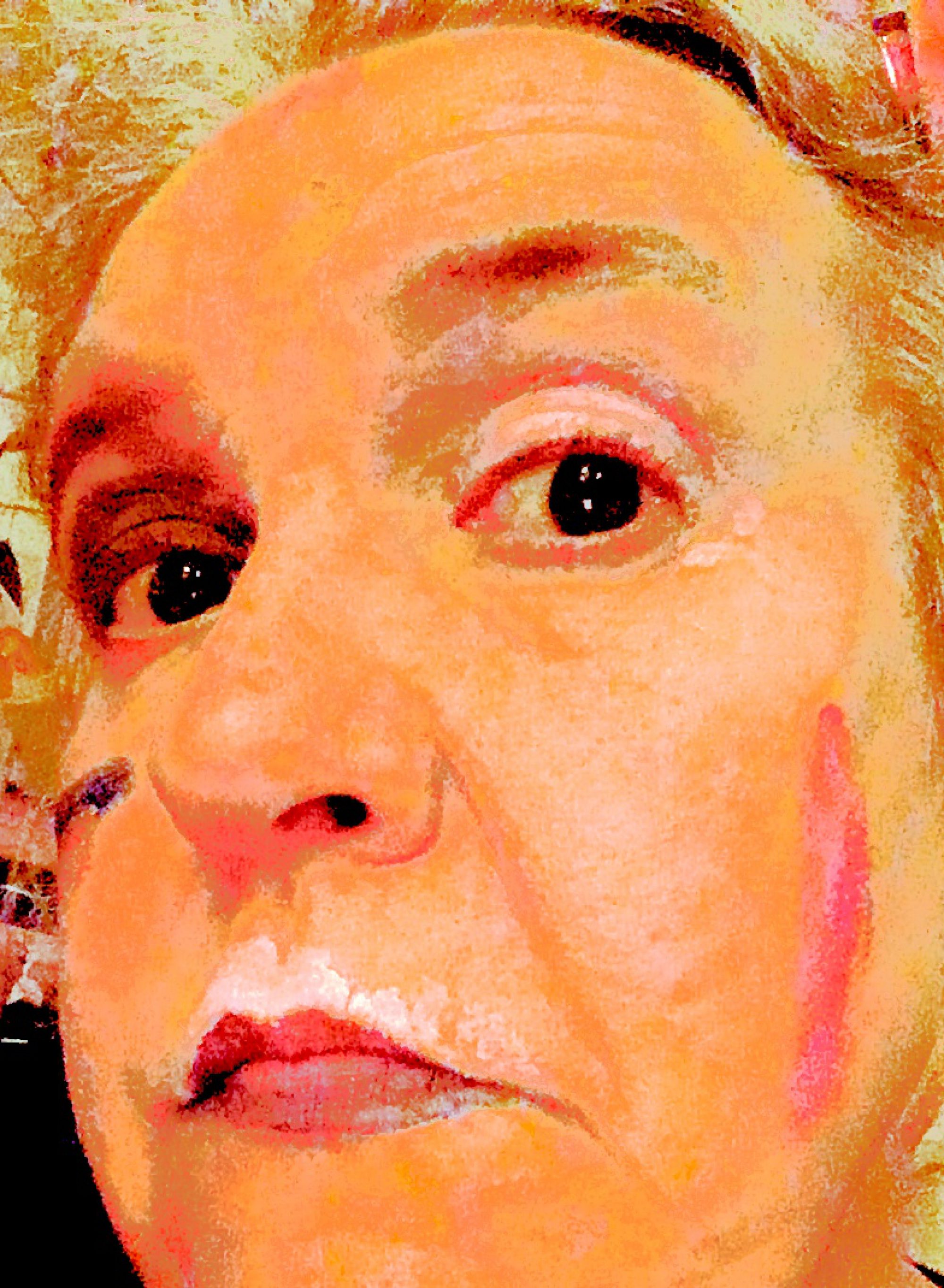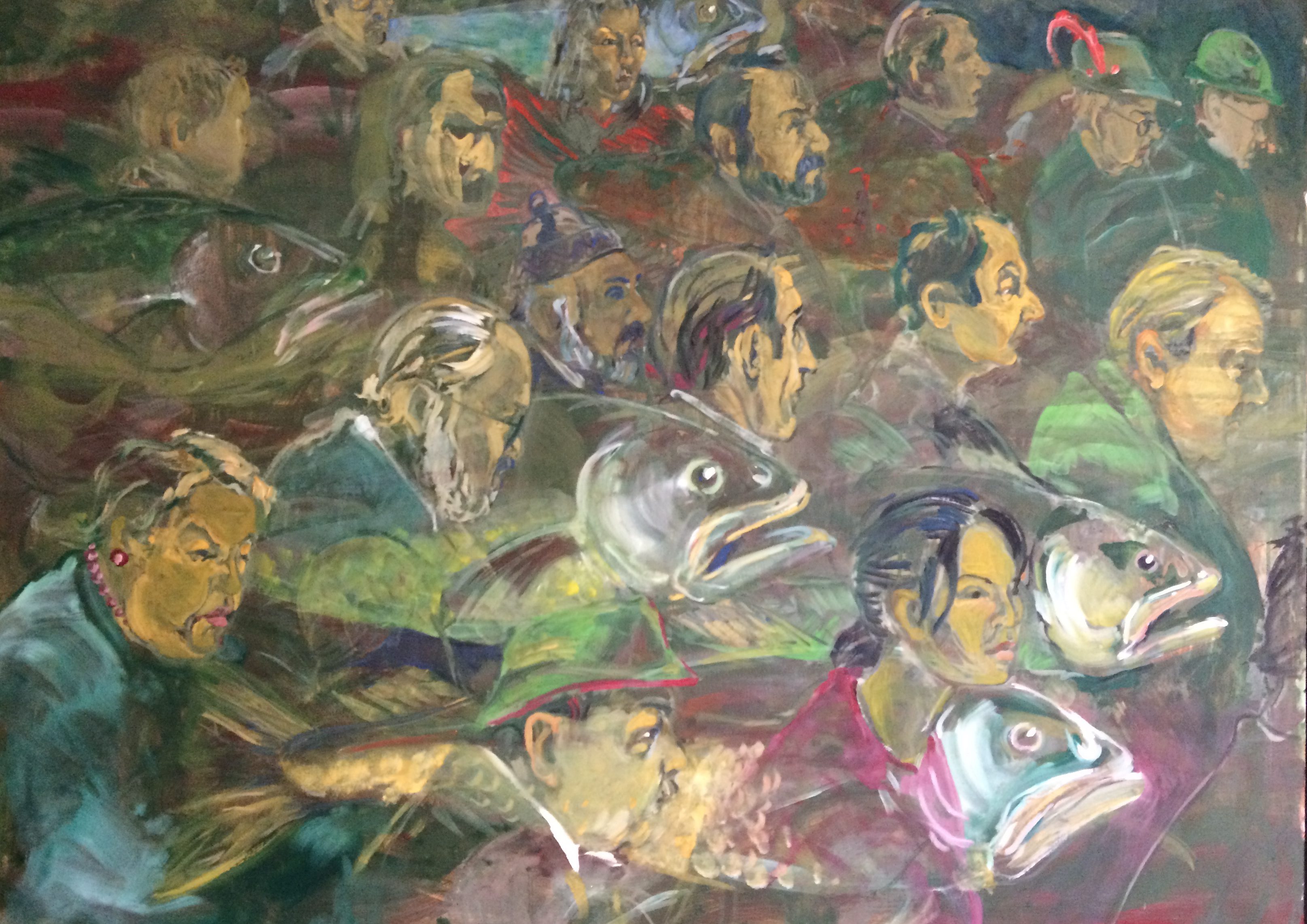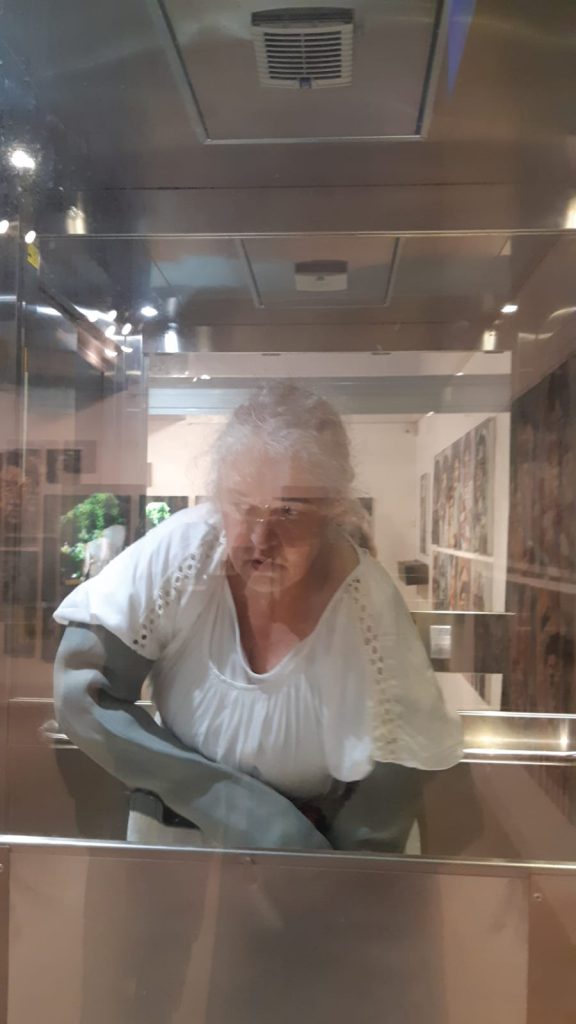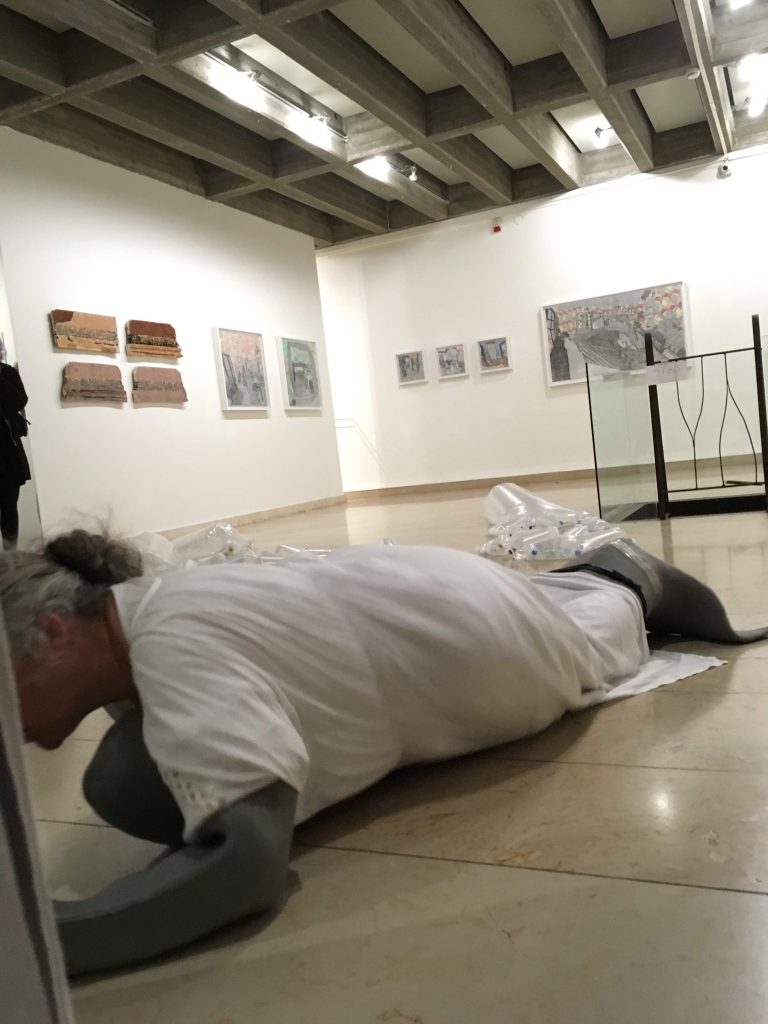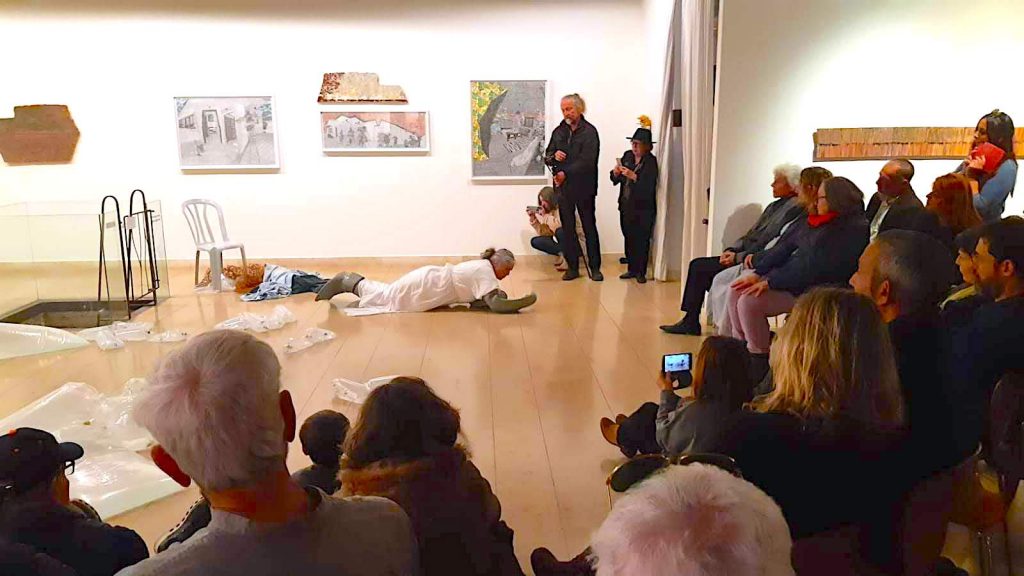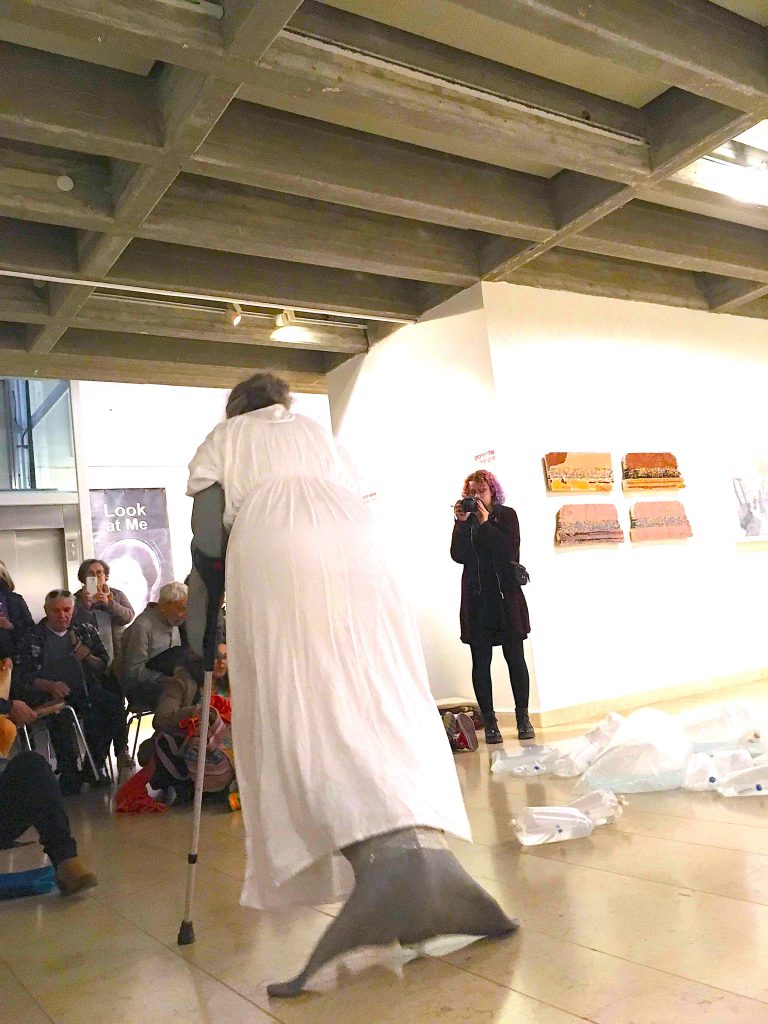Janco-Dada-Museum, Ein Hod 12.01.2019
r i s h r u s h
The principle of all things is water; everything is made of water, and everything returns to the water.
So the Greek philosopher Thales of Miletus knew it already about 600 years BC.
Water is the primary element of the world and its origin.
It is a common good, a human right (UN-Resolution 2010) and of course a natural right. Who owns the water?
75% of the earth is covered by water, only 3% of it freshwater.
Water is liquid, of indefinite shape and always in motion. Water is fresh, cool, thirst quenching and cleansing. Water is untamed and threatening, deep and mysterious. Water is changeable in its course, flow, depth and dynamics.
There are myths of aquatic spirits, nymphs and gods in underwater palaces, of protective or threatening water women and redeeming mermaids. Naiads, Nereids and Nymphs. Rusalka, Loreley and Melusine. Tethys, Susanoo, Derketo, Eurynome, Nammu, Athirat, Iemanijá, Ran and more.
There are facts about water-apartheid: where money flows, water flows. There are facts about the composition of water: atoms, molecules, salts, gases. The biology knows: 90% of an infant consists of water, an old person only 60%. And the treasures of the oceans are well-known: in addition to oil and gas, there are now also large plastic deposits…
Facts are that fish – the oldest (450 million years) and most species-rich (20,000 different species) group of vertebrates – spend their entire lives in water and that they are extremely adaptable. They were the first ones. And from the bubbling mountain stream to the endless expanse of the oceans, countless different habitats have emerged for fish.
In different cultures and religions, a fish is a symbol of the water itself, a symbol of life and fertility, a sign of hope, a turn for the better, for happiness, wealth and good harvest, and it helps to ward off the evil eye.
… and now?… there is something to hear…
Ocean waves? Bubbles? Sirens at the bottom of the sea? Are they fish or other aquatic beings? What do we hear? Who do we hear?
Do we hear all those for whom water is prerequisite for life? So, everyone?
It is sounding water music: small song puddles, dripped songs, gurgling arias, flowing spirituals. A cantata shower complacent?
Music by Bach, Bowie, Brecht, Beach Boys, Baden-Powell and others, as well as English, Hebrew, Arabic, German, Italian, Hungarian, Dutch and French songs about the importance, the nature and the beauty of water: rain, low tide and flood, wells and springs, cold, thirst-quenching, soothing, shimmering and holy water, the power and the gentle, reflecting waves, rushing rivers, wild sea, danger, wind and storm, shore and sand, silence, the search for water, yearning and thirsty.
Singing sounds seemingly in the midst of water from water pipes, tubes, puddles, rivers and lakes in Europe, Israel and Palestine. Water samples are in test tubes, which, like small fish in transport bags, surround the singing.
At some point fish will end up in the dry.
Why?
Do they leave their element voluntarily?
Is their habitat disturbed? Are they at risk?
They suffocate, they choke on plastic, they die of thirst. Fishes.
More than 1 billion people have no access to drinking water and 5 million die each year from diseases caused by polluted water. People.
To survive, they have to change … the people? The fish?
They turn upside down, they turn around. It turns around. The fish in the human. The human from the fish. It appears in the midst of the fish a being who can hear, but can not speak nor sing…
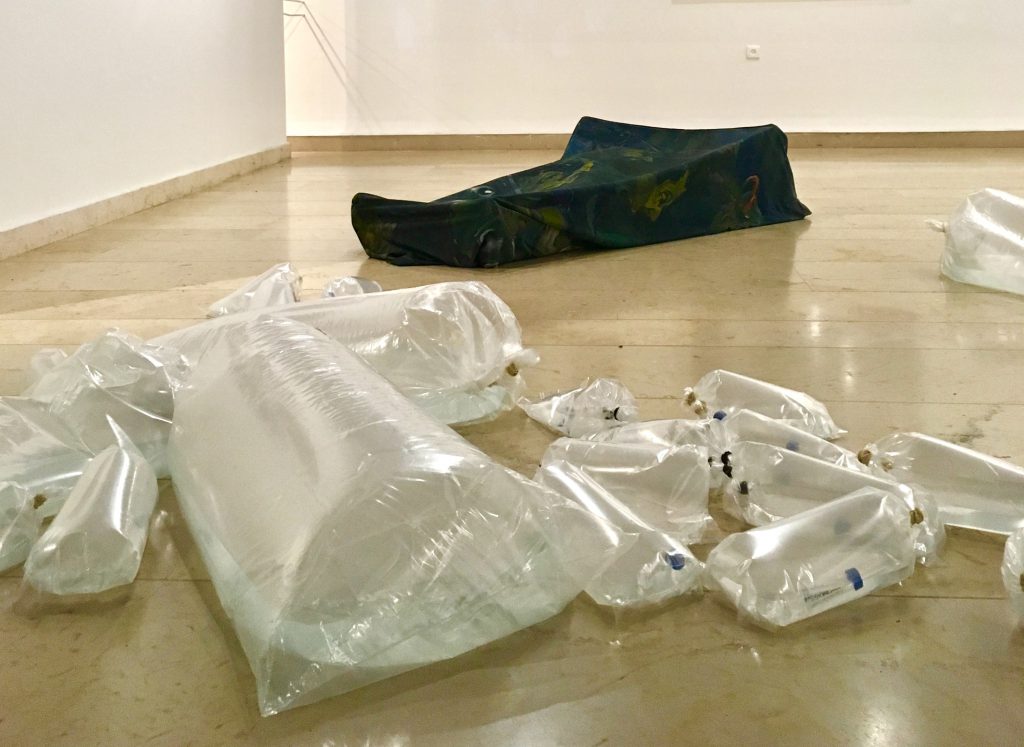
Avec la mer du Nord pour dernier terrain vague. Et des vagues de dunes pour arrêter les vagues. Et de vagues rochers que les marées dépassent. Et qui ont à jamais le cœur à marée basse. 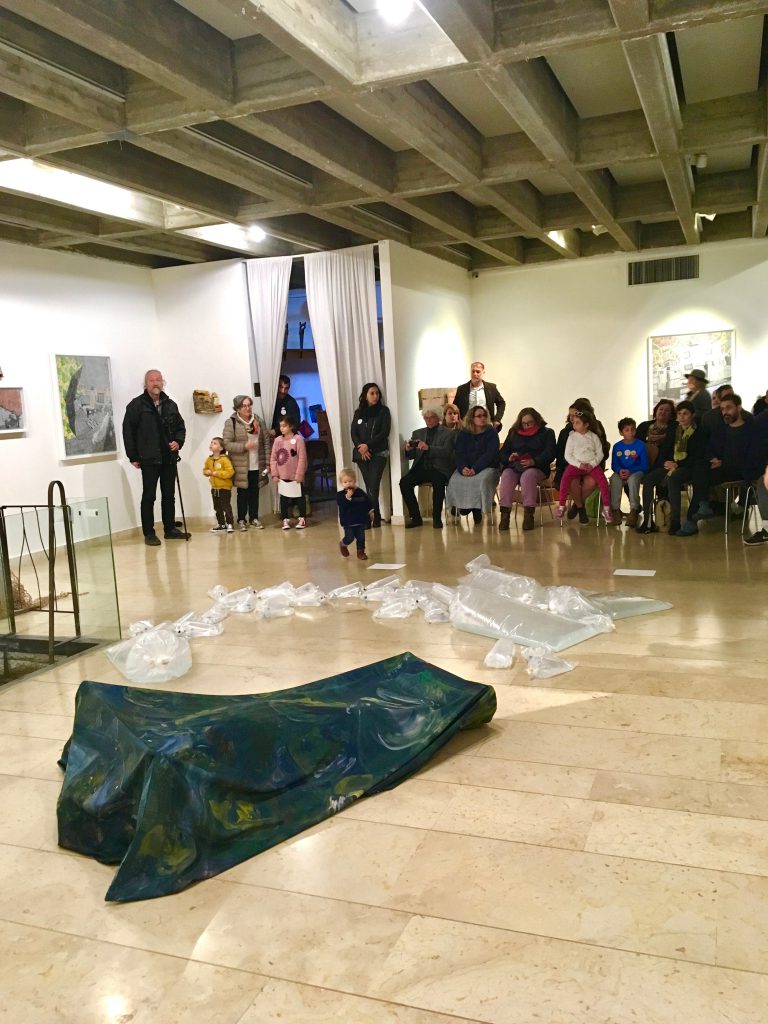
… I´m looking for water… looking, looking, ah… 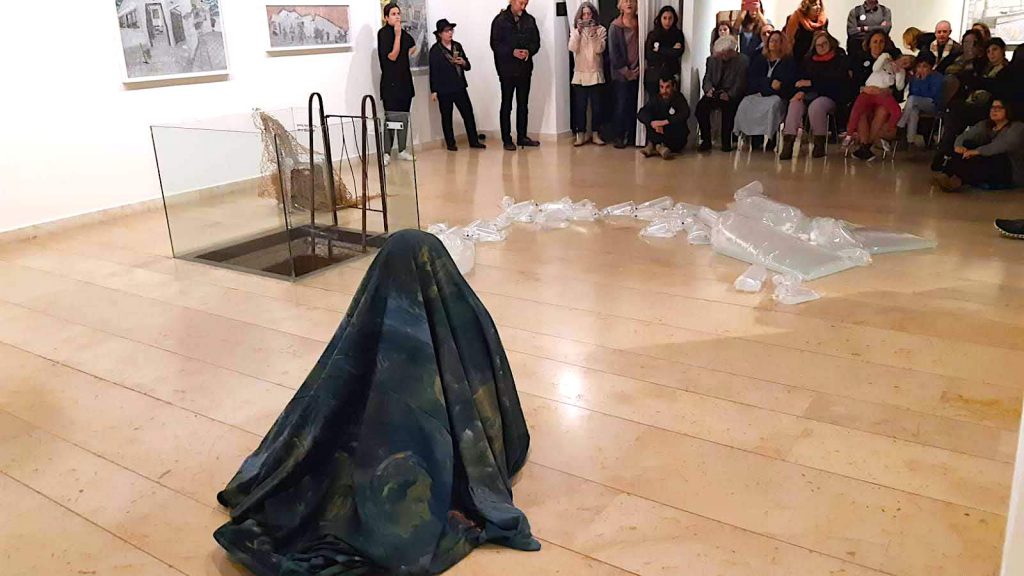
אֵלִי, אֵלִי שׁלֹא יִגָמֵר לְעוֹלָם הַחוֹל וְהַיָם, רִשְׁרוּשׁ שֶׁל הַמַיִם, בְרַק הַשָׁמַיִם תְפִלַת הָאָדָם 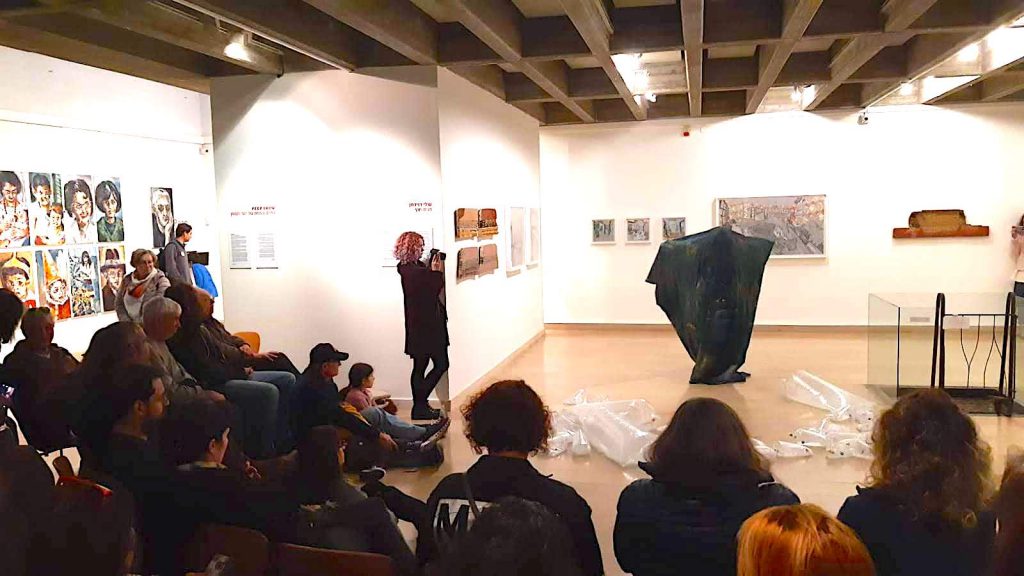
So schnell ein rauschend Wasser fließt. 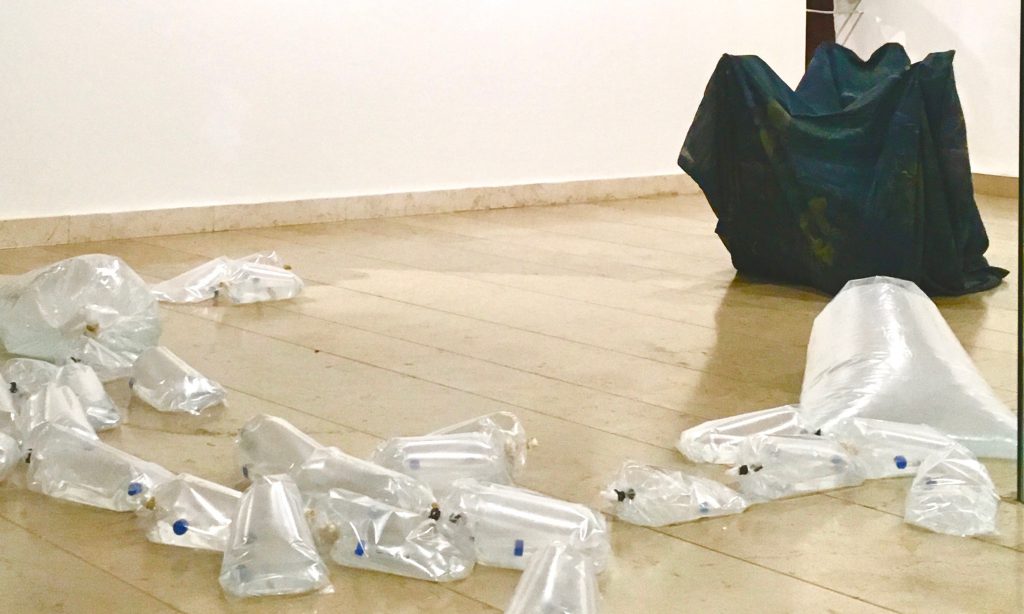
… في البحر سمكة بتزق سمكة عالشط واقف صياد بشبكة 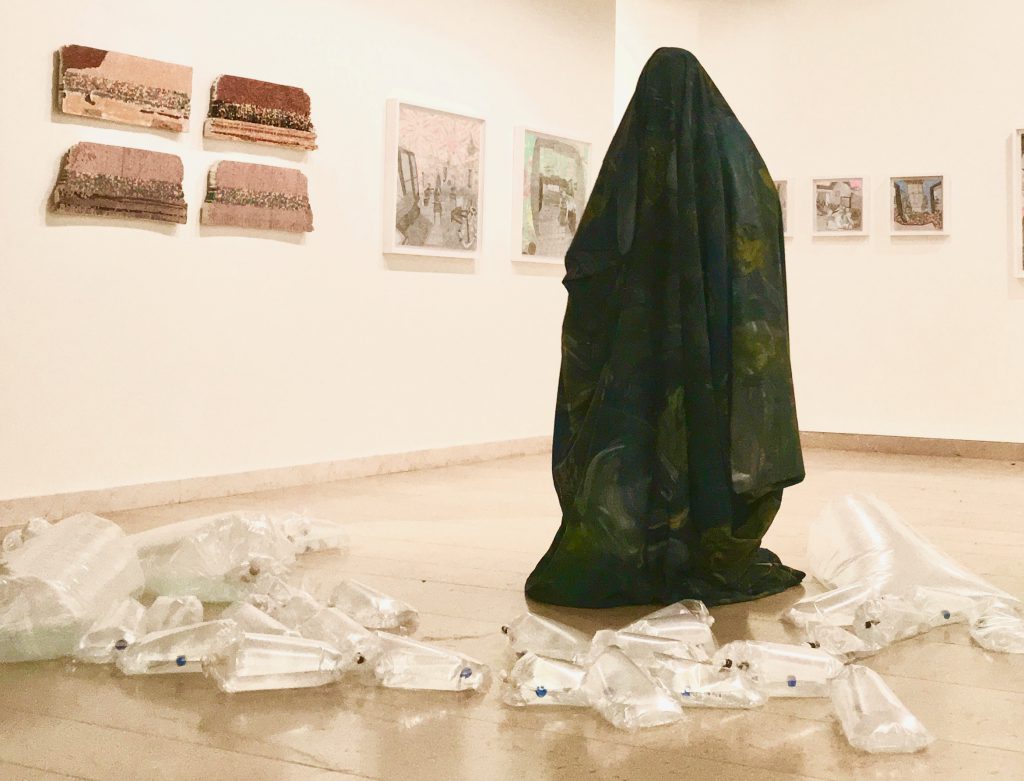
Als sie ertrunken war und hinunter schwamm, von den Bächen in die größeren Flüsse, schien der Opal des Himmels sehr wundersam, als ob er die Leiche begütigen müsse. 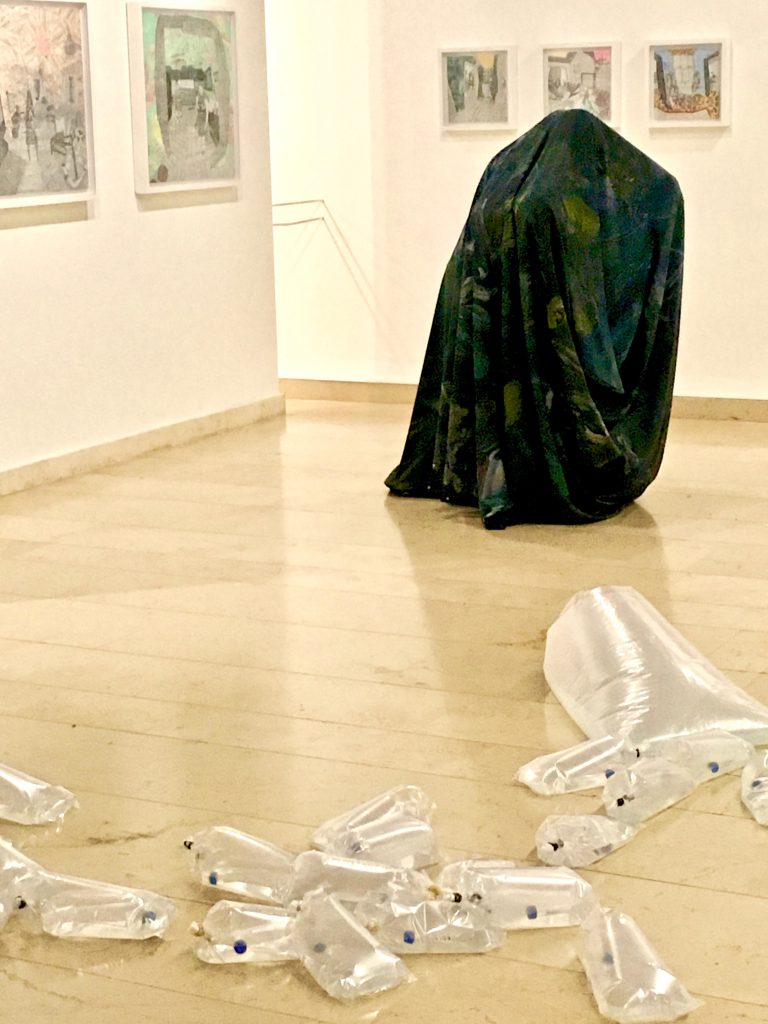
Ha folyóvíz volnék, bánatot nem tudnék. Hegyek közt, völgyek közt szép csendesen folynék, bánatot, haj, nem tudnék. 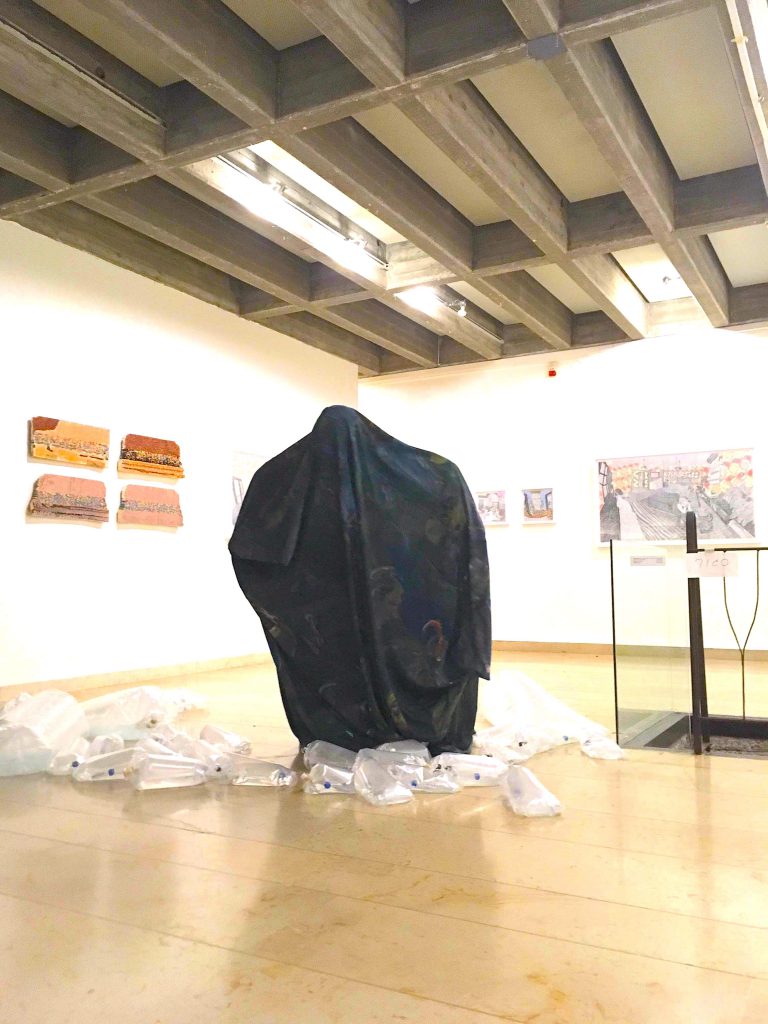
Iemanjá… a cantar, na maré que vai e na maré que vem do fim, mais do fim, do mar bem mais além…
r i s h r u s h
Das Prinzip aller Dinge ist Wasser; aus Wasser ist alles, und ins Wasser kehrt alles zurück.
So wusste es bereits um die 600 Jahre v.Chr. der griechische Philosoph Thales von Milet.
Wasser ist der Urstoff der Welt und ihr Ursprung.
Es ist ein gemeinschaftliches Gut, ein Menschenrecht (UN-Resolution 2010) und natürlich ein Naturrecht. Wem gehört das Wasser?
75 % der Erde ist von Wasser bedeckt, nur 3 % davon ist Süßwasser.
Wasser ist flüssig, also von unbestimmter Form und immer in Bewegung. Wasser ist frisch, kühl, durstlöschend und reinigend. Wasser ist ungebändigt und bedrohlich, tief und geheimnisvoll. Wasser ist veränderlich in seinem Lauf, in seiner Fließgeschwindigkeit, Tiefe und Dynamik.
Es gibt Mythen von im Wasser lebenden Geistern, Nymphen und Göttern in Unterwasserpalästen, von schützenden oder bedrohlichen Wasserfrauen und erlösungsbedürftigen Meerjungfrauen. Naiaden, Nereiden und Nymphen. Rusalka, Loreley und Melusine. Tethys, Susanoo, Derketo, Eurynome, Nammu, Athirat, Iemanijá, Ran und viele mehr.
Es gibt Fakten von der Wasser-Apartheid: da, wo Geld fließt, fließt Wasser. Es gibt Fakten über die Zusammensetzung des Wassers: Atome, Moleküle, Salze, Gase. Die Biologie weiß: 90% eines Säuglings besteht aus Wasser, ein alter Mensch nur noch aus 60%. Und bekannt sind die Schätze der Weltmeere: neben Öl und Gas gibt es inzwischen auch große Plastikvorkommen…
Fakten sind auch, dass Fische – die älteste (450 Millionen Jahre) und artenreichste Gruppe (20.000 verschiedene Arten) Gruppe der Wirbeltiere – ihr ganzes Leben im Wasser verbringen und extrem anpassungsfähig sind. Sie waren die Ersten. Und vom sprudelnden Gebirgsbach bis zu den unendlichen Weiten der Weltmeere haben sich unzählige unterschiedliche Lebensräume für Fische entwickelt.
Der Fisch gilt in verschiedenen Kulturen und Religionen als Sinnbild für das Wasser an sich, als Symbol des Lebens und der Fruchtbarkeit, als Zeichen für Hoffnung, für die Wende zum Positiven, für Glück, Reichtum und gute Ernte und er hilft bei der Abwehr des bösen Blicks.
… und jetzt?… da ist etwas zu hören…
Meeresrauschen? Blubbern? Sirenen am Meeresgrund? Sind es Fische oder andere Wasserwesen?
Werden all diejenigen zu hören sein, für die Wasser Voraussetzung für das Leben ist, also alle?
Es erklingt Wassermusik: kleine Liederpfützen, hingetropfte Songs, gluckernde Arien, fließende Spirituals. Eine Kantaten-Dusche gefällig?
Musik von Bach, Bowie, Brecht, Beach Boys, Baden-Powell und anderen sowie englische, hebräische, arabische, deutsche, italienische, ungarische, niederländische und französische Lieder über die Bedeutung, die Natur und die Schönheit des Wassers: Regen, Ebbe und Flut, Brunnen und Quellen, kaltes, durstlöschendes, beruhigendes, schimmerndes und heiliges Wasser, die Kraft und das Sanfte, spiegelnde Wellen, rauschende Flüsse, wilde See, Gefahr, Wind und Sturm, Ufer und Sand, Stille, die Suche nach Wasser, Sehnsucht und Durst.
Ein Singen erklingt scheinbar inmitten des Wassers, aus Wasserleitungen, Rohren, Pfützen, Flüssen und Seen in Europa, Israel und Palästina. Wasserproben befinden sich in Reagenzröhrchen, die, wie kleine Fische in Transportbeuteln, den Gesang umgeben.
Irgendwann landen die Fische auf dem Trockenen.
Wieso?
Verlassen sie ihr Element freiwillig?
Ist ihr Lebensraum gestört, sind sie in Gefahr?
Sie ersticken an der Luft, sie ersticken an Plastik, sie verdursten. Fische.
Mehr als 1 Milliarde Menschen hat keinen Zugang zu Trinkwasser und 5 Millionen sterben jährlich an Krankheiten, die durch verschmutztes Wasser ausgelöst wurden. Menschen.
Um zu überleben, müssen sie sich verändern… die Menschen? Die Fische?
Jetzt stülpen sie sich um. Es stülpt sich um. Der Fisch im Menschen. Der Mensch aus dem Fisch heraus. Es erscheint inmitten aus den Fischen ein Wesen, das hören, aber nicht sprechen noch singen kann…
